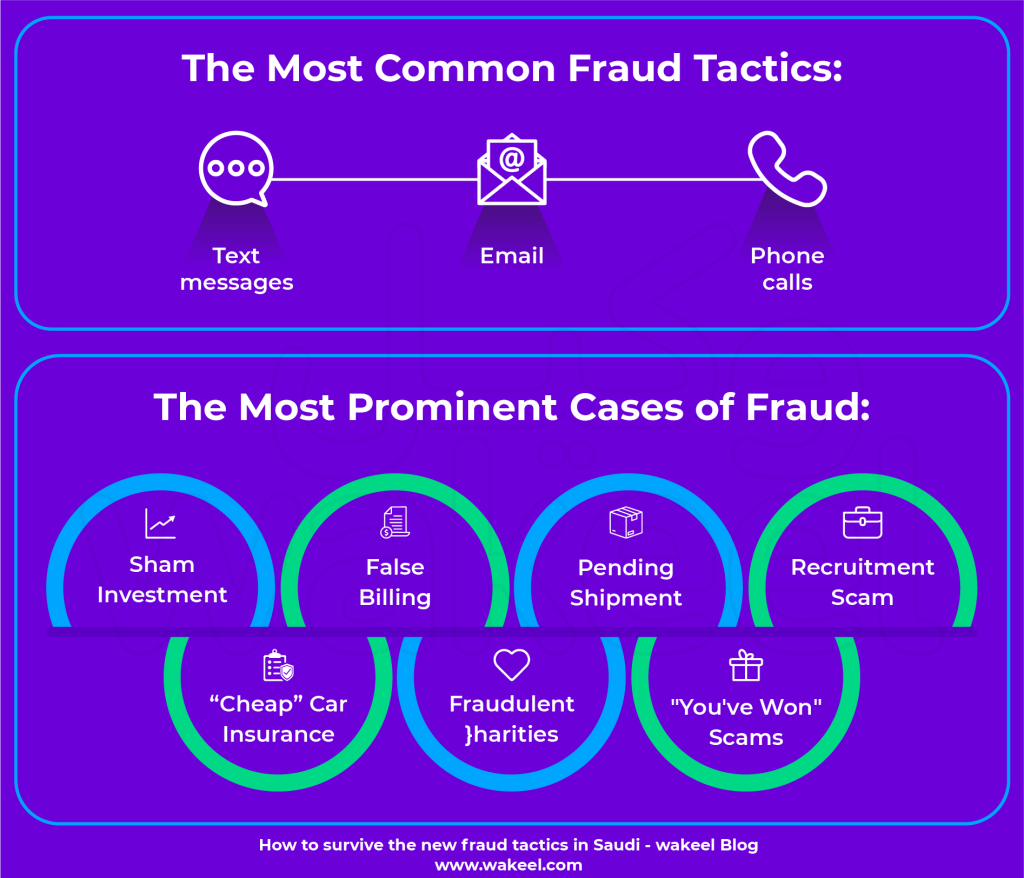
How to survive the new fraud tactics in Saudi
In today’s world, technology made everything easier. It’s easier to connect to people across the globe, share information instantly, and perform real-time transactions. Undeniably, digital transformation in Saudi brings the virtue of increased connectivity and efficiency, but also new challenges. As we develop new technologies to replace traditional processes, so do fraudsters and scammers! Criminals will adapt to any situation on hand and take advantage of it. They have used technology as an outlet for their cunning schemes; mastering new fraud tactics: over phone calls, text messages, e-mail, and just recently social media platforms.
Lately, the Saudi Central Bank “SAMA” had logged numerous consumer complaints related to fraud and phishing. Accordingly, The Saudi Data and Artificial Intelligence Authority and other private bodies urged consumers to raise awareness about fraudulent actions and to report any suspicious activity.
As a matter of fact, phishing scams continue to be the most commonly experienced crime around the world. Every year, millions fall victim to new fraud tactics. The scammers are sophisticated cunning, and opportunists. They target people of all social backgrounds, age groups, and incomes. Thus, the more digital the world becomes, the more cautious you have to be.
The most common fraud tactics
Fraud is a crime as old as time; but ever since we became heavily dependent on technology, fraud, and scams have followed closely behind. Today, there are countless tactics and methods fraudsters employ. For example, fraudsters created phishing scams to “phish” for your personal and financial information to take over your accounts, commit fraud, or steal money.

Typically, fraudsters carry out scams through seemingly harmless sources, watch out:
- Phone calls: Beware of phone calls from unknown numbers. In a phone call scam, also known as vishing, the scammer poses as people or institutions that you trust to “bait” you with trust to get your valuable information.
- To gain your trust, some scammers will spoof caller ID. In this practice, scammers cloak their real number, and instead, the caller ID may display a local number, when in fact the scammer is calling from abroad.
- Email: Many scammers target unsuspecting victims via email, this is also known as phishing. It often starts with emails that seem to be from companies or people you know to trick you into clicking on a link or performing an action like logging in to a website.
- To prove their “credibility”, scammers will copy logos, and trademarks, or create similar email or website addresses, for example, they’ll miss or replace a letter. For example, micros0ft.com where the second “o” has been replaced by 0 or. So, watch out for typos.
- Text messages: Similarly, text message scams, also known as smishing, encourage unsuspecting victims to click malicious links or visit fake, redirected websites.
The closer you look, the more you see
Once you familiarise yourself with fraud tactics, you can almost spot a scam immediately. Here’s a golden rule of thumb: when in doubt, don’t give out.
With awareness as your safety net, you can minimize the chance of being a victim:
- The Recruitment scam: Be careful when you receive an unsolicited job offer; before providing any information, be sure to research the company and verify the caller’s position. A red flag you should never ignore is a request to pay any sum of money in advance.
- The pending shipment: Scammers will also pose as your well-trusted delivery company, claiming that there is a “pending” shipment for you. The scammer will ask you to pay a little sum of money via the link they sent for the fake shipment delivery.
- The false bill or Account Notice: Often, scammers send urgent “warnings” to pay a bill, or update account details “for verification purposes.” These messages contain a few red flags to look out for: poor grammar and spelling, using impersonal greetings, and most importantly an insistence on urgency.
- Sham investment: Scammer may approach you about investing in high-return investment opportunities in what is likely no existing business. Don’t agree to invest because the caller seems trustworthy or has an impressive title. Here’s a red flag: if it’s too good to be true, it probably is. Talk to a licensed investment advisor, first.
- Prize winner/ free vouchers: Don’t get too excited if you win an unexpected prize or free vouchers; most of the time this is a scam. Your red flag is when claiming your valuable prize requires clicking a link for “verification.”
- Scam charities: Criminals seek to take advantage of people’s generous nature. They’ll even impersonate charities or very well-known community figures to raise a fund. Red flag: In Saudi, people can only donate to government-approved charities and organizations.
- Cheap car insurance: From time to time, ghost brokers, claiming to provide cheap car insurance, sway unsuspecting victims. The best way to find affordable car insurance in Saudi is to compare car insurance on a licensed price comparison website in Saudi.
How do you protect yourself against fraud tactics?
To stay safe and secure, here’s what you should know:
- Do not provide personal or financial details to anyone you do not know or trust over the phone, emails, texts messages, or on a not secure website.
- Never give out any personal or financial details to an unrevised person or a website – use common sense, always!
- Likewise, try to limit the personal information you share on social media. To a scammer, your full name, mobile number, date of birth, and where you live can provide instant access to bank accounts.
- Make sure to set strong personal IDs/passwords and update them frequently
- Don’t share your OTP with anyone, banks or service providers never ask for your passwords or OTPs. Scammers will use your OTP to max out your account in a blink!
- Reject offers of products and services that come from unknown, unverified persons, emails social media accounts, etc.
- Buy car insurance directly from licensed car insurance, or use a licensed price comparison website if you’re looking for better car insurance offers in Saudi Arabia.
The dangers of fraud
The devil may work hard, but scammers work increasingly harder to get your money or personal details.
Fraud can be a traumatic experience that often causes real and irreversible losses. For businesses, financial fraud causes, institutions, and governments to incur millions of losses annually, which are known as “estimated or potential losses.” As for victims, fraud can cause depression, health problems, and in some cases, take people’s lives.
What do I do if I accidentally gave out personal information?
If you gave sensitive information, don’t panic! The sooner you detect fraudulent activity, the lower the financial impact. Follow these steps to ensure your rights:
- Reset passwords on your accounts immediately.
- Then, notify all banks you do business with to freeze your account and keep monitoring your financial transaction carefully.
- Report the fraudulent activity to the nearest police station, or file a report through Kollona Amn App.
All in all, scammers will continue to exploit the public as long as they can find new ways to trick the unsuspecting. However, taking the time to identify and deal with fraudulent tactics helps reduce their success rates and increase your peace of mind.
